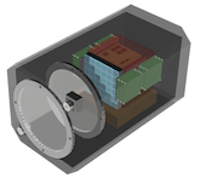USB¶
Description¶
Mini-EUSO will store data on USB flash drives which will be sent to Earth periodically during its mission. USB storage will also be used to pass configuration files to Mini-EUSO and quick-look diagnostic data back to Earth via the ISS internet connection.
UsbManager makes use of the libusb package to identify USB devices and handle automated data backups using rsync whenever the instrument is switched on.
UsbManager¶
-
class UsbManager¶
handles the interface to all USB devices, including data storage and automated backup
Public Functions
-
UsbManager()¶
constructor. initilaises num_storage_dev as N_USB_UNDEF
-
uint8_t LookupUsbStorage()¶
lookup usb storage devices connected and identify them designed to avoid detecting the cameras and other devices as storage
-
int RunDataBackup()¶
spawn thread to run data backup in the background
-
int KillDataBackup()¶
kill the data backup thread, used when shutting down the data backup thread holds no locked resources
Public Members
-
uint8_t storage_bus¶
defines the bus upon which USB storage is present depends on the CPU module
-
uint8_t num_storage_dev¶
stores the number of storage devices connected
-
bool backup_launched¶
stores true if a data backup is running
Public Static Functions
-
static int CheckUsb()¶
check the number of devices connected and print their info
Private Functions
-
void CheckCpuModel()¶
check cpu model to select correct storage_bus
-
int DataBackup()¶
define data backup based on num_storage_dev
-
int GetDeviceInterface(libusb_device *dev)¶
returns an int which represents the usb device interface (see libusb_class_code)
- Parameters:
the – libusb device descriptor
Private Members
-
std::thread::native_handle_type backup_thread_handle¶
stores the backup thread handle
Private Static Functions
-
static void PrintDev(libusb_device *dev)¶
print a description of usb devices connected for debugging purposes
- Parameters:
dev – the libusb device handle
-
UsbManager()¶
